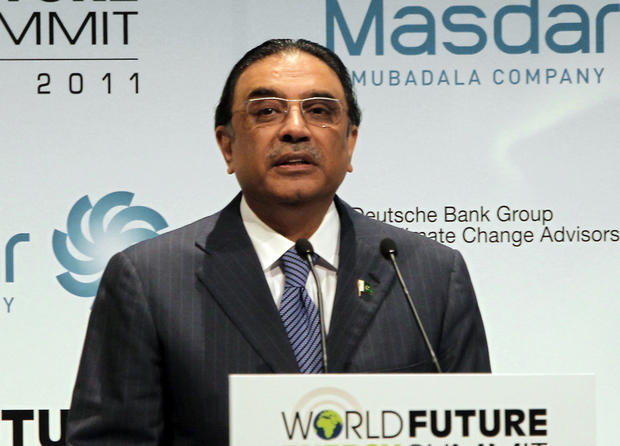Pakistan president's health concerns may further cloud U.S. relations
ISLAMABAD - Uncertainty mounted Wednesday over the future of Pakistan president Asif Ali Zardari after news of his possible cardiac ailment prompted fresh speculation over the future of democratic rule in a country considered a close ally by the United States.
Zardari, 56, who unexpectedly became the de facto leader of the ruling Pakistan People's Party (PPP) after the December 2007 assassination of his late wife Benazir Bhutto, was airlifted to Dubai at short notice on Tuesday after officials said he suffered chest pains just a day earlier on Monday.
Zardari underwent medical tests for his heart in Britain in September as well. Though the Pakistani government officially said Zardari had gone to Dubai for routine medical tests, two senior Pakistani government officials who spoke to CBS News both confirmed that the president was specifically seeking medical attention for a cardiac condition.
One of the two officials went a step further when he confirmed speculation that Zardari may have suffered a mild heart attack on Monday.
"The president has a history of cardiac ailments. On Monday, he felt discomfort in his chest and was examined by his doctors who suspected a mild cardiac episode," the official said on condition of anonymity. "He was rushed to Dubai on Tuesday to make certain that the president receives the best medical care available near our region."
The sudden concern over Zardari's health immediately prompted worries over the future of Pakistan's politics as well as relations with the West, including the United States, a European ambassador told CBS News on condition of anonymity.
For the U.S. and other Western countries, Pakistan continues to present itself as a worrisome case of a nation where Islamic militants have made inroads in mainstream politics, in opposition to Zardari's Pakistan People's Party, which is known as a mainstream and liberal political force.
Zardari and the PPP appear to be increasingly unpopular at a time when ordinary Pakistanis are braving an overall economic deterioration, compounded by the effects of a militancy backed by al Qaeda and the Taliban. The discovery and subsequent killing of Osama bin Laden by U.S. Navy SEALs in Pakistan's northern city of Abbottabad in May has made the ruling structure even more unpopular, given that many Pakistanis consider the attack to have been an infringement of Pakistan's sovereignty.
The U.S. decision to withhold any advance warning of the bin Laden raid from Pakistan's civil and military officers only added to popular anger with Washington.
"President Zardari and the ruling structure are very much seen in Pakistan as cronies of the United States," the European ambassador said. "I suspect, any signs of Zardari losing his grip over the country will probably give a morale boost to Islamists and their supporters."
A Pakistani foreign ministry official, citing the latest reports on president Zardari's medical condition told CBS News Wednesday that, while Zardari's condition was serious, he was beginning to stabilize in Dubai.
"It is a serious condition but the president remains stable for now," he said.
However, the European ambassador warned that even if Zardari returns home after a fully recovery, questions over his condition will haunt him.
"Pakistan is surrounded by lots of rumors, including some that president Zardari's health will be the cause for his departure. Even if he comes back and the government lets it known to the people that he is stable, popular suspicion surrounding the president's condition will not end."
